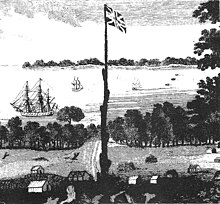Cline Town: Difference between revisions
Reverted good faith edits by Wikiaddict8962 (talk): Considerable content removed before moving to longer title. (TW) |
Restore content added by Wikiaddict8962 |
||
| Line 1: | Line 1: | ||
{{Use dmy dates|date=April 2012}} |
{{Use dmy dates|date=April 2012}} |
||
[[Image:Province of Freedom.jpg|thumb|right|Looking north to Bullom Shore from ''Voyages to the River Sierra Leone'' by John Matthews, 1788]] |
[[Image:Province of Freedom.jpg|thumb|right|Looking north to Bullom Shore from ''Voyages to the River Sierra Leone'' by John Matthews, 1788]] |
||
'''Cline Town''' is an area in [[Freetown, Sierra Leone]]. The area is named for Emmanuel Kline, a [[Hausa]] Liberated African who bought substantial property in the area. |
|||
| ⚫ | |||
| ⚫ | Cline Town, [[Sierra Leone]], which used to be known as Granville Town, was established in 1787 by the London-based [[Committee for the Relief of the Black Poor]]. They arranged for the transport of London's so-called Black Poor to Sierra Leone where they were amongst its original settlers. Many of these Black Poor were [[Black Loyalist]]s who had decided or were forced to leave the United States after the [[American War of Independence]]; some came via several years in [[Nova Scotia]], another [[British North America]]n colony and so are known as [[Black Nova Scotians]]. All asserted a [[British Empire|British]] identity. Some were formerly [[West Indian]] enslaved [[wikt:Afro-Caribbean|Africans]] and a few were [[Bengali people|Bengali]]. Some English wives also were part of the settlement. Granville Town (named for its benefactor and patron [[Granville Sharp]]) was established as the first town of the [[Province of Freedom]] before it was destroyed in 1789. The town was rebuilt in 1791 with the assistance of [[Alexander Falconbridge]], a former surgeon on a slave ship. Some [[Sierra Leone Creole people|Creole]] families such as the Clarkes and Reeds (Reids) are descendants of the Old Settlers. |
||
==Sources== |
==Sources== |
||
Revision as of 08:27, 14 July 2013

Cline Town is an area in Freetown, Sierra Leone. The area is named for Emmanuel Kline, a Hausa Liberated African who bought substantial property in the area.
Cline Town, Sierra Leone, which used to be known as Granville Town, was established in 1787 by the London-based Committee for the Relief of the Black Poor. They arranged for the transport of London's so-called Black Poor to Sierra Leone where they were amongst its original settlers. Many of these Black Poor were Black Loyalists who had decided or were forced to leave the United States after the American War of Independence; some came via several years in Nova Scotia, another British North American colony and so are known as Black Nova Scotians. All asserted a British identity. Some were formerly West Indian enslaved Africans and a few were Bengali. Some English wives also were part of the settlement. Granville Town (named for its benefactor and patron Granville Sharp) was established as the first town of the Province of Freedom before it was destroyed in 1789. The town was rebuilt in 1791 with the assistance of Alexander Falconbridge, a former surgeon on a slave ship. Some Creole families such as the Clarkes and Reeds (Reids) are descendants of the Old Settlers.
Sources
